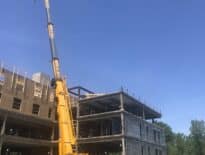A huge batch of state grants for 27 different projects announced Thursday will see 1,597 affordable and mixed-income housing units built or preserved.
Gov. Maura Healey, Lt. Gov. Kim Driscoll and incoming Secretary of Housing and Community Development Ed Augustus announced the $246 million package in Lowell.
The funding sources include $105 million in direct subsidies, $60 million from federal American Rescue Plan Act (ARPA) funding, and $81 million in state and federal tax credits, Healey’s office said.
In awarding the funds, Healey’s office said, preference was given to projects that incorporated “green and sustainable building practices” and which included housing for seniors, families and very-low-income renters. Of the nearly 1,600 units funded by Thursday’s package, 300 will be set aside for the latter.
“We are thrilled to see projects in communities across Massachusetts, from Pittsfield to Provincetown, that have strong local support and will bring much needed new housing to our neighborhoods,” Driscoll said in a statement. “Our housing needs are great, and we are excited to move forward with a new, cabinet-level secretariat to create more homes and lower housing costs for residents.”
Projects funded include:
2085 Washington St., Boston
The development, a partnership between Trinity Financial and Madison Park Development Corp., will feature 64 affordable rental units as well as 32 mixed-income condominium units and below-grade parking on a site adjacent to the Tropical Foods grocery at the corner of Melnea Cass Boulevard and Washington Street in Roxbury. DHCD will support the project with federal and state low-income housing tax credits, subsidy funds, and ARPA funds. The city of Boston will support the project with significant funds of its own. The completed project will include 16 rental units for households earning less than 30 percent of AMI and, in some cases, transitioning from homelessness. In addition, MassHousing will support the ownership units with funds from its Commonwealth Builders program. The project has been designed to meet Passive House certification standards.
Parcel R-1, Boston
Planned for a city-owned parking lot in Boston’s Chinatown neighborhood, Asian Community Development Corp. is building a 12-story building with 66 affordable rental units, 44 affordable condominiums and a new branch of the Boston Public Library. DHCD will support the rental units in Parcel R1 with federal and state low-income housing tax credits and subsidy funds. The city of Boston also will support the project with funds of its own. When completed, the 66 rental units will be restricted for households whose average income is below 60 percent of AMI, 14 of which will be further restricted for households earning less than 30 percent of AMI and, in some cases, transitioning from homelessness. Asian CDC intends to meet Passive House certification standards.
Meshacket Commons, Edgartown
Meshacket Commons is a new construction project to be built in Edgartown on Martha’s Vineyard. The project sponsor is a partnership between Affirmative Investments and the nonprofit Island Housing Trust. The partnership was selected by local officials to develop the town-owned site in 2021 and received zoning permission through Chapter 40B. When completed, Meshacket Commons will offer 36 total units: 32 affordable rental units and four condominiums. DHCD will support the project with federal and state low-income housing tax credits, subsidy funds, and ARPA funds. The town of Edgartown also will provide support to the project. The project has been designed to meet Passive House certification standards.
Curtis Apartments, Worcester
Trinity Financial has partnered with the Worcester Housing Authority on the demolition of 372 obsolete units of public housing and the new construction of 527 affordable units. The money awarded Thursday helps fund the project’s first phase, which will include construction of 129 new units in two buildings, with over 80 percent of the units reserved for households earning less than 60 percent of AMI. At least 13 units will be further restricted for households earning less than 30 percent of AMI. DHCD will support the project with federal and state low-income housing tax credits, subsidy funds, and ARPA. The city of Worcester also will support the project with funds of its own. Curtis Apartments Phase 1 has been designed to meet Passive House certification standards.






